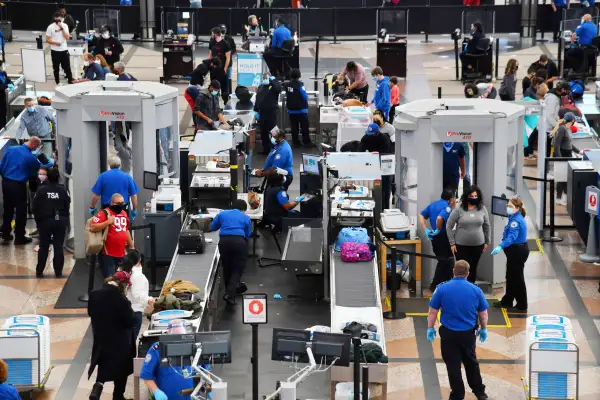Long Lines, Flight Delays and High Prices: What Travelers Can Expect at Airports This Summer

If you thought air travel was stressful before the pandemic... brace yourself.
Travelers are heading to the airports in droves this summer, and security checkpoint workers are struggling to keep up. The Transportation Security Administration (TSA) screened 1,858,328 travelers at checkpoints on Tuesday alone, according to the administration. While that's well below how many travelers there were during the same time in 2019, it's over triple what TSA saw this time last year, and staffing shortages have resulted in extra-long waits at airports.
"It’s certainly the peak summer season," says Robert Mann, an airline industry analyst in Port Washington, New York. "But this summer is different because of the pent-up vacation and visiting-friends-and-relatives demand."
Between cancelled flights, long wait times, surprisingly high airfares, the rising spread of the Delta variant of COVID-19 and tension over mask mandates and compliance, taking a flight this summer may be a lot more hectic and unpleasant than you've grown accustomed to.
Here's what to expect when you fly this summer.
Cancellations, flight delays and unruly passengers
On Tuesday, there were 5,202 delays within, into or out of the U.S. and 186 cancellations, according to data from FlightAware.
Why so many? Well, you can't fly a plane with no jet fuel — and a shortage of that fuel in some U.S. airports may cause flights to be cancelled or be forced to make extra stops, CNN reported. The cause of the shortage appears to be too few truck drivers to deliver the fuel, and because pipelines pivoted from carrying jet fuel when the pandemic stopped air travel. The shortage has mostly been seen in western destination spots, like Montana, Nevada and Wyoming.
Severe weather and a lack of enough staff is also causing cancellations and delays, Slate reported. Last month, there were 9,399 flights cancelled worldwide, according to FlightAware.
There have also been cases of passengers not following the COVID-19 guidelines airlines have put in place, causing the air staff to delay flights while the situation is resolved. One American Airlines flight from North Carolina to the Bahamas was delayed earlier this month in part because teenage passengers reportedly refused to wear their masks.
Tensions have been running high regarding the mask mandate. Roughly 75% of Federal Aviation Administration (FAA) unruly-passenger reports in 2021 stem from confrontations with travelers who refused to comply with the mask requirement, CNBC reported recently.
Crowded airports and long wait times
You probably won't be zipping through security this summer.
Earlier this summer, TSA warned that there may be long lines at the airport as the administration suffers from staff shortages. (TSA even started issuing $1,000 sign-on bonuses in its scramble to attract employees, CNBC reported.) Passengers at the Pensacola International Airport in Florida reported missing their flights as lines snaked through the terminal, according to WEAR-TV.
It's not just security — there are long lines for passengers once they're through the TSA checks as well. Starbucks workers at the Phoenix Sky Harbor International Airport told the Wall Street Journal that staffing is far behind customer demand, leading to long lines. An executive at the Dallas/Fort Worth International Airport sent a note to airport concessionaires asking them not to "steal" employees from one another, according to CNBC. (Travelers are also spending hours on hold when calling airlines.)
And while passengers on many flights last summer enjoyed extra space as airlines kept middle seats empty to distance travelers, that policy ended when Delta stopped blocking middle seats in May. With the high demand of the summer travel season, flights are often packed.
"Everyone is going to be sharing an arm rest," Mann says.
Potentially high prices — and how to save on flights
Sky-high demand may also lead to higher flight prices. In mid-May, the flight-booking app Hopper reported that round-trip domestic airfare was already up 12% since April.
Domestic airfare flight prices are now comparable to those during the summer of 2019, Hopper economist Adit Damodaran tells Money. (International travel prices are still down around 15% to 20% from where they were in the summer of 2019.)
But you don't have to empty your pockets if you shop smart. Here are a few tips for saving on airfare this summer:
- Book early. Book your flight no later than three weeks in advance of your departure date, as prices jump 25% two weeks out and another 30% in the final week, according to Hopper. “That's the biggest thing you can do regardless of your route, regardless of the airline,” Damodaran says.
- Be flexible. If you can avoid flying when everyone else is, you should. It's almost always cheaper to fly during the middle of the week, so you should try to depart and return on Tuesday or Wednesday — and if you can't do that on both legs, at least try to return or depart on those days, Damodaran says. (If you're afraid you'll have to cancel, consider travel insurance so you don't lose all your money.)
- Find where low-cost carriers are flying. Low-cost airlines like Spirit and Frontier added tons of routes to travel destinations like Florida when business travel fell by the wayside. If you’re headed to leisure destinations, look at routes low-cost carriers are flying because other carriers have had to drop their prices to those destinations as well, Damodaran says.
- Compare flight prices. Don't jump on the first flight you see, but instead use sites like Google Flights and Skyscanner to see which flights are cheaper (especially if your travel schedule is flexible). You can also set up alerts for cheap flights on sites like Kayak.
- Use a travel rewards card. Before booking, check to see if you have air travel rewards via your credit card that you can put towards your flight. (Money has a list of the best travel rewards cards.)
More from Money:
9 Best Travel Insurance Companies of 2021
